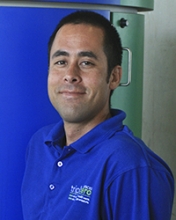Recycling Coordinator Says Waste Not, Want Not
 Campus community members who’ve attended large events at UC Merced or sat through New Employee Orientation in recent years have likely met Matthew Hirota.
Campus community members who’ve attended large events at UC Merced or sat through New Employee Orientation in recent years have likely met Matthew Hirota.
Hirota works for Facilities Management as the campus’s waste reduction/recycle coordinator. One of his primary responsibilities is to help UC Merced produce zero waste by 2020, which is part of the campus’s Triple Zero commitment. He does so by educating faculty and staff members, students and visitors about how to properly dispose of their waste.
At events, Hirota can often be found standing near recycling, compost and trash bins, helping people figure out which receptacles to use. Plastic water bottles, aluminum cans and clean paper can be recycled, so those go in blue bins. Dirty paper plates with leftover food scraps? Compostable, green bins. Potato chip bags and those little coffee creamer containers? Those can’t be recycled or composted, so in the trash they go.
Better yet, he advises, stop using those individual coffee creamers.
Hirota, who joined the university in 2011, gives his spiel once a month to the campus’s newcomers during New Employee Orientation, which also gives him an opportunity to educate them about UC Merced’s Triple Zero goal. A year after he started at UC Merced, Hirota collaborated with Eric Scott of the UC Merced Library to create the circular refuse containers used in the Lantern.
He has also found other ways to help save the university money while reducing UC Merced’s waste. The money earned from recycling helps fund the salaries of student workers who sort the  campus’s refuse. The program has helped create 20 student jobs since its inception. The student workers developed and maintain a website, Facebook page and other social media channels, along with all of the campus’s waste and recycling posters and related signage.
campus’s refuse. The program has helped create 20 student jobs since its inception. The student workers developed and maintain a website, Facebook page and other social media channels, along with all of the campus’s waste and recycling posters and related signage.
Hirota recently talked with Panorama about his role:
Please describe what your job entails.
I oversee student workers as they collect and sort all upper-campus trash, recycling and compost. I also have students deliver bins for special events. Furthermore, I’m expected to come up with and implement new and better ways to accomplish zero waste. Working with other departments is essential to reaching our goal, so I work very closely with Dining Services, and we have instituted reusable to-go containers and compostable drinking cups and utensils. I work with departments across the campus to help them to have zero-waste events. We have had many events, on campus, that were 99 percent or higher diversion.
What attracted you to UC Merced?
I like the progressive attitude of the University of California system in general, and I knew some people who worked in this department. I wanted the opportunity to work with them. I also liked the way UC Merced treats its employees.
What do you find most rewarding about your job?
I really enjoy working with my students. It’s rewarding to be able to give them their first job and teach them how to be good employees. Another thing that I find rewarding about my job is seeing how I have helped create positive change on campus. I appreciate that I am allowed and encouraged to be creative and innovative.
What are some of the challenges you face in your role?
The greatest challenge I face is convincing people that there can be a new and better way to do things. Sometimes people are so used to doing something a certain way that it is difficult for them to try a different approach. I want to educate people about the positive and negative effects of their actions so that they will care about living their lives in a way that will have a positive impact on our campus, our community and our planet.
What new initiatives, projects or plans are you looking forward to in the coming year?
I am excited because we are working on getting compost bins in all office areas and implementing a new waste system for offices. We are also talking with Housing and Residence Life and Dining Services about improving their waste diversion.
What did you want to be when you grew up?
A ninja.
Tell us something interesting about you that people might not know.
I am not an American citizen. I was born in Canada and lived there my whole life until I was 26. I met a beautiful California girl and relocated to be with her. Luckily for me, she said, "Yes."
